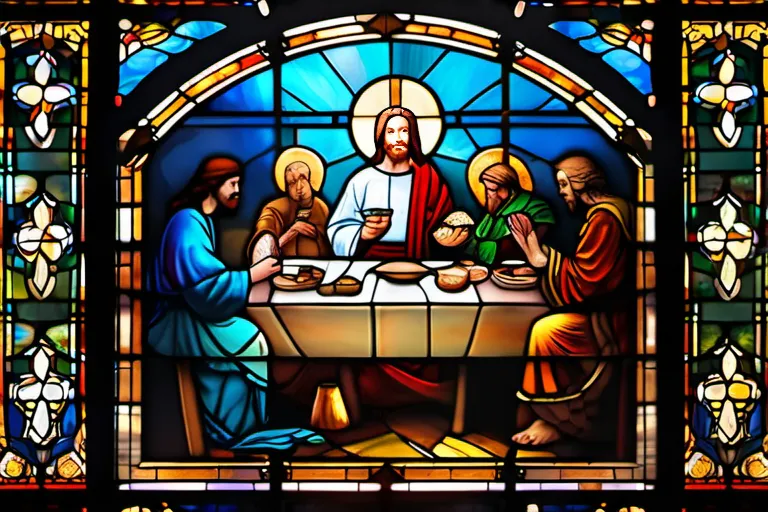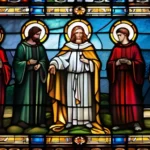Exploring the Theological, Historical, and Practical Implications of Holy Communion in the Christian Faith
Welcome to our enlightening exploration into one of the most sacred rituals in Christianity – Communion. In this article, we delve deep into the profound meaning, historical roots, and practical significance of Holy Communion within the Christian faith.
The Origins of Communion: From the Last Supper to Today
The origins of Communion stretch back to one of the most pivotal moments in Christian history: the Last Supper. Picture it, if you will—the room filled with disciples, the table laden with bread and wine. This simple meal was more than just a feast; it was a profound act that laid the foundation for Communion as we know it today.
During this event, Jesus took bread and wine, symbolically giving them new meaning through his words: ‘This is my body’ and ‘This cup is the new covenant in my blood.’ These phrases are not just historical echoes but resonate with power and significance even now. It’s as if Jesus was saying, ‘Let this be a reminder of me—of my sacrifice and love.’
As Christianity spread through the centuries, so did the practice of Communion. In different regions and denominations, it evolved in its form but remained a central act of worship. From the early days where it might have been shared communally to more structured services today, each ritual carries the weight of its history.
Imagine walking into a church service where the bread is distributed to every member. It’s not just food; it’s a tangible connection to those who came before us and to Christ himself. How many times have you pondered what Jesus meant when he said ‘Do this in remembrance of me’? Each time, Communion invites us to reflect on that momentous night and the love that transcends time.
From the Last Supper onwards, Communion has stood as a testament to Jesus’ sacrifice. It’s more than just a ritual; it’s a lived experience that connects the faithful with each other and with Christ in ways both profound and personal. As we partake of this sacrament today, we are reminded of our shared faith and the enduring legacy of the one who said, ‘This is my body.’
The Theological Significance of Communion in Christianity
The theological significance of Communion in Christianity is profound and multifaceted, much like a rich tapestry woven with threads from the fabric of the Bible. How can something as simple as bread and wine carry such deep meaning? These elements are more than just symbols; they represent the core of Christian faith and practice.
Imagine, for a moment, that Communion is not merely an act but a window into another realm—a divine doorway where the past meets the present. Through this ritual, Christians are invited to participate in the sacrifice of Jesus Christ, his death on the cross, which is now remembered and reenacted through the elements of bread and wine.
Why do we call it a sacrifice? Is it not an oxymoron when these substances are so commonplace and seemingly insignificant? Yet, in the context of Communion, they hold immense weight. They symbolize Christ’s self-offering, his ultimate act of love and redemption for humanity. Through this act, we are reminded of our own frailty and need for grace.
In essence, Communion is a meal of spiritual nourishment. It’s like feeding on the very body and blood of Christ, which strengthens us in faith and sustains us through trials. How does one truly internalize such profound symbolism? The act of breaking bread and drinking wine becomes a profound expression of unity with Christ, not just as an individual but as part of a larger community.
Moreover, Communion serves as a reminder to reflect on our own lives. It challenges us to consider the depth of Christ’s sacrifice and how we can embody his teachings in our daily existence. This ritual invites us to ask ourselves: How do I honor Christ‘s sacrifice through my actions? Am I living a life that is transformative, one that reflects love and compassion?
The power and significance of Communion are indeed profound. It’s not just about the act itself but the deep theological implications that permeate every aspect of this sacred practice. Through Communion, Christians are invited to experience the tangible presence of Christ in their lives, a presence that offers healing, comfort, and a reminder of eternal life.
The Historical Evolution of Communion Practices
The Historical Evolution of Communion Practices: Explore how different Christian denominations have approached Communion over time and the various practices that have emerged.
Imagine stepping back in time to the early days of Christianity, when the practice of Communion was still fresh and new. How did these early believers approach this sacrament? Was it a solemn ritual or a joyful celebration? Over centuries, as different denominations arose, so too did diverse practices surrounding Communion.
In the early Church, Communion was often seen as a shared meal, reminiscent of Jesus’ Last Supper with his disciples. The apostolic tradition held that this meal was a communal act, emphasizing unity and fellowship among believers. But as time passed, various interpretations and practices began to diverge.
Consider the Eastern Orthodox Church, where Communion is often reserved for baptized members only, with strict fasting requirements before receiving the bread and wine. This practice highlights the sacred nature of the sacrament, making it a profound spiritual experience. In contrast, some Protestant denominations offer Communion more freely, viewing it as an opportunity for all believers to participate in the remembrance of Christ’s sacrifice.
The Catholic Church, on the other hand, has its own rich traditions, including the concept of Transubstantiation, where the bread and wine literally become the body and blood of Christ. This belief sets Catholic Communion apart, making it a transformative moment in worship. Yet, even within this tradition, there are variations, such as the practice of Communion on the Tongue, adding another layer of reverence to the ritual.
It’s fascinating how these different practices reflect not just theological beliefs but also cultural and historical contexts. For instance, in some African churches, Communion might be celebrated communally, with shared plates of bread symbolizing unity and love. Meanwhile, in Western traditions, individual cups are more common, each serving as a personal encounter with the sacred.
As we explore these varied practices, it’s clear that Communion is not just about following rules but embracing a rich tapestry of meaning and significance. Each tradition offers unique insights into how we can connect with Christ in this profound way. So, whether you are partaking in a shared meal or receiving the elements individually, consider what this act means to you personally and spiritually.
The Preparation and Administration of Holy Communion
The Preparation and Administration of Holy Communion: Learn about the proper preparation, administration, and etiquette surrounding Holy Communion in Christian worship services.
Imagine stepping into a sacred space where every gesture and every word carry profound meaning. The preparation for Holy Communion is as important as its execution. Just as a bride spends months preparing for her wedding day, Christians prepare themselves spiritually for this sacrament.
In many churches, the altar or communion table is meticulously prepared. Clean linen cloths are laid out to ensure a clean and respectful setting. The bread, often referred to as the host, and the wine are carefully checked. Is it the right kind of bread? Shouldn’t the wine be red for its rich symbolism?
The priest or minister must also be in a state of grace, which means they have confessed their sins and are ready to lead others in this holy act. This is where the significance lies: each participant needs to approach Holy Communion with a heart open to forgiveness and reconciliation.
During the administration of communion, there’s an etiquette that is both simple and profound. In some traditions, everyone receives the bread and wine from the same vessels. The priest may distribute it using a chalice or individual cups. But the act itself is a personal encounter with Christ’s presence among us.
What happens when someone is ill or unable to come to church? In such cases, the sacrament can be administered in their home by a minister or through a system of reservation and distribution outside the church. These practices highlight the flexibility and love that underpin this ritual.
The administration of communion is not just about receiving something; it’s about participating in an ancient tradition that connects us to Christ and each other. Each sip, each bite, is a reminder of Jesus’ sacrifice and His continued presence with us today.
The Symbolic Meaning of the Elements: Bread and Wine
The Symbolic Meaning of the Elements: Bread and Wine
Imagine walking into a quiet church on Easter Sunday, the air thick with the scent of incense and the soft glow of candles casting a warm light. As you approach the altar, your eyes are drawn to the bread and wine, symbols so profound that they hold the weight of centuries of worship and tradition.
Bread, in Christian theology, is often seen as a representation of the body of Christ. Just as bread nourishes the physical body, Jesus’ body offers spiritual sustenance. When you partake of the bread during communion, you are not just eating something made of wheat and flour; you are partaking in the very essence of God’s love and sacrifice. How can such a simple loaf carry such weight?
Wine, on the other hand, is often viewed as a symbol for the blood of Christ. This imagery evokes both the suffering and the ultimate sacrifice of Jesus. The wine spills from the cup, reminiscent of his blood that flowed during his crucifixion. By drinking this wine, believers are not just consuming grape juice; they are partaking in the memory of a profound act of redemption.
Consider this: when Jesus shared the bread and wine with his disciples at the Last Supper, he was establishing a ritual that would endure for centuries. He was saying, ‘This is my body, broken for you,’ and ‘This is my blood, shed for many.’ These words hold such power because they connect us to a moment of divine self-sacrifice.
So, why do we use bread and wine? Why not just water or any other drink? The answer lies in the rich symbolism. Bread and wine are universal symbols of sustenance and life, and by using these elements, Christians connect their spiritual experience with the physical world, making it tangible and real.
As you kneel at the altar rail, take a moment to reflect on the profound meaning behind these simple yet powerful elements. In every bite of bread and sip of wine, remember the sacrifice that Jesus made for us all. It’s more than just a meal; it’s a divine transaction that binds us together in faith.
The Impact of Communion on a Christian’s Spiritual Life
The impact of Communion on a Christian’s spiritual life is profound and multifaceted, much like the intertwining branches of a tree that reach for sunlight and support each other in unity. How often do we pause to reflect on the transformative power of partaking in Holy Communion? Isn’t it remarkable how something as simple as bread and wine can carry such deep theological significance?
When you receive the bread, think about it as a symbol of Jesus’ body, broken for our sins. How does this breakage affect your perspective on suffering and sacrifice in your own life? And when you taste the wine, consider it as a reminder of his blood shed for redemption. Can you imagine the weight of that sacrifice bearing down upon you during Communion?
Partaking in Holy Communion is more than just following a ritual; it’s an invitation to enter into a deeper relationship with God. It’s like stepping into a sacred space where the barriers between Heaven and Earth are momentarily dissolved. How does this experience of unity with Christ affect your daily walk as a believer? Does it bring you closer to understanding the love that He has for you?
Moreover, Communion serves as a reminder of the community we belong to—both in the present and the future. It is a time when Christians from all walks of life come together, breaking bread not just with each other but also symbolically with Christ himself. In this act, don’t you feel a sense of belonging that transcends worldly divisions? How does this sense of community strengthen your faith?
The power and significance of Communion lie in its ability to continually nourish the soul, much like how food sustains the body. It is a constant reminder of God’s presence and grace in our lives, offering us strength and courage as we navigate through challenges. As you partake in this holy meal, ask yourself: How can I allow the teachings of Jesus to shape my actions and decisions outside of Communion?
Reflecting on these questions during and after Holy Communion can deepen your spiritual life, making each moment a step towards greater understanding and connection with God. Consider how you can integrate the lessons from this sacred ritual into your everyday living to see the true power and significance of Communion in Christianity.
How does participating in Holy Communion change your outlook on life? Share your thoughts and experiences in the comments below, and let’s continue this conversation together as we explore the profound impact of this beautiful sacrament.
Conclusion
 By understanding the power and significance of Communion, we can grow deeper in our faith, strengthen our bond with God, and truly appreciate the sacrifices made by Jesus Christ for our salvation. May this guide serve as a stepping stone towards a more spiritual and fulfilling relationship with God.
By understanding the power and significance of Communion, we can grow deeper in our faith, strengthen our bond with God, and truly appreciate the sacrifices made by Jesus Christ for our salvation. May this guide serve as a stepping stone towards a more spiritual and fulfilling relationship with God.











